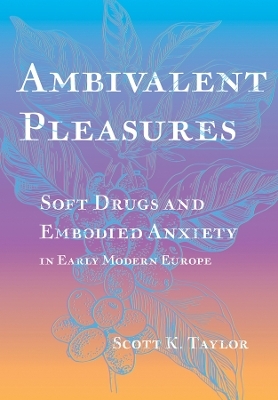
Ambivalent Pleasures
Soft Drugs and Embodied Anxiety in Early Modern Europe
Seiten
2024
Cornell University Press (Verlag)
9781501775468 (ISBN)
Cornell University Press (Verlag)
9781501775468 (ISBN)
Ambivalent Pleasures explores how Europeans wrestled with the novel experience of consuming substances that could alter moods and become addictive. During the early modern period, psychotropic drugs like sugar, chocolate, tobacco, tea, coffee, distilled spirits like gin and rum, and opium either arrived in western Europe for the first time or were newly available as everyday commodities.
Drawing from primary sources in English, Dutch, French, Italian, and Spanish, Scott K. Taylor shows that these substances embodied Europeans' anxieties about race and empire, religious strife, shifting notions of class and gender roles, and the moral implications of urbanization and global trade.
Through the writings of physicians, theologians, political pamphleteers, satirists, and others, Ambivalent Pleasures tracks the emerging understanding of addiction; fears about the racial, class, and gendered implications of using these soft drugs (including that consuming them would make users more foreign); and the new forms of sociability that coalesced around their use.
Even as Europeans' moral concerns about the consumption of these drugs fluctuated, the physical and sensory experiences of using them remained a critical concern, anticipating present-day rhetoric and policy about addiction to drugs and alcohol.
Drawing from primary sources in English, Dutch, French, Italian, and Spanish, Scott K. Taylor shows that these substances embodied Europeans' anxieties about race and empire, religious strife, shifting notions of class and gender roles, and the moral implications of urbanization and global trade.
Through the writings of physicians, theologians, political pamphleteers, satirists, and others, Ambivalent Pleasures tracks the emerging understanding of addiction; fears about the racial, class, and gendered implications of using these soft drugs (including that consuming them would make users more foreign); and the new forms of sociability that coalesced around their use.
Even as Europeans' moral concerns about the consumption of these drugs fluctuated, the physical and sensory experiences of using them remained a critical concern, anticipating present-day rhetoric and policy about addiction to drugs and alcohol.
Scott K. Taylor is Associate Professor of History at the University of Kentucky. He is the author of Honor and Violence in Golden Age Spain.
Introduction: A Unified Drug Culture
1. Stained with Spots of Human Blood: Disgust, Pleasure, and the Senses
2. Chocolate, or an Indian Drink: The Cultural Geography of Drugs and Alcohol
3. Who from Excess Is Free? Medicine and Addiction
4. Do We Take Physick Every Day? Early Modern Wellness and Self-Medication
5. And So the Game Goes Round: Women and Sociability
6. Who Should Poison the People? The Ethics of Commerce
Conclusion: An English Opium-Eater
| Erscheinungsdatum | 04.07.2024 |
|---|---|
| Zusatzinfo | 9 b&w halftones - 9 Halftones, black and white |
| Verlagsort | Ithaca |
| Sprache | englisch |
| Maße | 152 x 229 mm |
| Gewicht | 907 g |
| Themenwelt | Geisteswissenschaften ► Geschichte ► Allgemeine Geschichte |
| Geisteswissenschaften ► Geschichte ► Regional- / Ländergeschichte | |
| Studium ► Querschnittsbereiche ► Geschichte / Ethik der Medizin | |
| ISBN-13 | 9781501775468 / 9781501775468 |
| Zustand | Neuware |
| Informationen gemäß Produktsicherheitsverordnung (GPSR) | |
| Haben Sie eine Frage zum Produkt? |
Mehr entdecken
aus dem Bereich
aus dem Bereich
Die Geschichte eines Weltzentrums der Medizin von 1710 bis zur …
Buch | Softcover (2021)
Lehmanns Media (Verlag)
CHF 27,90
von der Antike bis zur Gegenwart
Buch | Softcover (2024)
C.H.Beck (Verlag)
CHF 16,80


